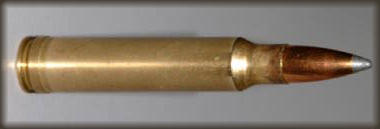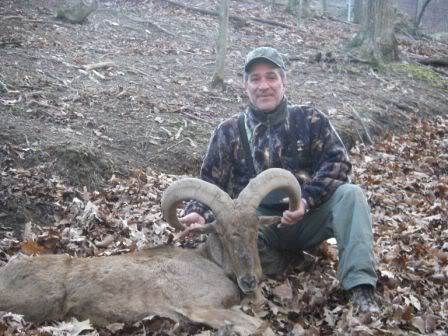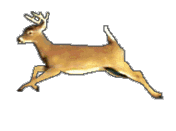

 The Accurate Reloading Forums
The Accurate Reloading Forums  THE ACCURATE RELOADING.COM FORUMS
THE ACCURATE RELOADING.COM FORUMS  Rifles
Rifles  Medium Bore Rifles
Medium Bore Rifles  Advice for dealing with flinch....
Advice for dealing with flinch....Go  | New  | Find  | Notify  | Tools  | Reply  |  |
| One of Us |
Does anybody have any advice/tips on how to get rid of a flinch when you shoot. I don't think I do it too badly, but occasionally when I forget to take the safety off/chamber a round, etc. I almost have to clean dirt out of the end of my barrel. | ||
|
| one of us |
There was a thread here awhile back about this. I forget all the details but one guy said we flinched because of the loud BANG. I started wearing ear plugs and muffs both, it worked. Windage and elevation, Mrs. Langdon, windage and elevation... | |||
|
| one of us |
Practice, practice, practice. And, good gun fit, proper scope mounting, and good recoil pad (Decelerator by Pachmayr). What caliber? Using too much gun? In the Army, we used a drill called "ball and dummy" where your coach/buddy took your rifle, and either put a live round in it or left the chamber empty, and handed the rifle to you with the safety on. You engaged the target, and if you had a flinch problem, when you had a dummy, it was obvious. This is something you can use in practice, concentrating on squeezing off the round without flinching. Repetition helps. An old pilot, not a bold pilot, aka "the pig murdering fool" | |||
|
| One of Us |
Having a buddy stand beside you and load your rifle with empties or live rounds while you don't look, is about a good as any. Also, you might try doing a lot of shooting with a light rifle like a .22. But handle the .22 like a big rifle, pulling it into your shoulder stoutly and grasping the forearm firmly with your off hand. When I was in Marine Boot Camp, I was trying to develope a flinch, so the drill instructor would stand beside me and every time I flinched, he would hit me in the head several times with a swagger stick. I'm not recommending that method but it does work. | |||
|
| One of Us |
Lots of practice, trigger control and concentrate on the target instead of what the gun will do. | |||
|
| One of Us |
Thanks for the help, guys. I was pretty much leaning towards lots of practice and your suggestions help. stillbeeman - I think we'll leave the sticks at home. My dad was in the Marine Corps and i remember him telling me a story of shooting in the prone position and the drill sargent kicking the barrel of the gun so the the gun recoil didn't seem so bad. | |||
|
| one of us |
Go back to the basics .Start with a low recoiling cartridge [even 22 if necessary] and do the basics , trigger control , sight picture. Then work up to higher recoiling rounds .Guns that fit , recoil pads , hearing protection all help. | |||
|
| One of Us |
As a competitive shooter in several disciplines, AND a fan of big bore doubles over my life-span, I have found myself developing a flinch on several occasions. What has worked best for me are a few things... 1. Force myself to try to see the muzzle-flash though the sight(s) each time I fire every rifle, regardless of how little or great the recoil. 2. As in golf or hitting a baseball (or even throwing a punch in boxing) also concentrate on a complete follow-through AFTER the shot. 3. Then practice pulling the trigger in ONE smooth motion...no starts, stops, or jerks while trying for a perfect sight picture. That doesn't mean to yank the trigger, just practice on getting the gun to go off with one long, smooth pull without hesitations. Naturally, one cannot really CONCENTRATE on 1, 2, and 3 simultaneously, so I concentrate first on "1", then after a few range sessions doing that, I turn to "2". After that, I then concentrate on #3. the object is to do each long enough and often enough to make each a subconscious habit. You CAN'T flinch while doing all of those three. If you do it enough to form a habit of keeping those eyes open, pulling the trigger in one smooth motion and seeing the shot "go", You will have learned to shoot (again) with no flinch...plus, you have the bonus of seeing exactly what the results of your shot are instantly after it is fired. Allows for timely follw-up, which is always handy when hunting. (It is one of the reasons shooting coaches ask you to "call" your shots...calling the shots requires the above three.) Anyway, that's how I see it, and practicing that way has worked well for me when I needed it Hopefully, Your Mileage May NOT Vary. Good luck, AC My country gal's just a moonshiner's daughter, but I love her still. | |||
|
| one of us |
Quit shooting big bores for awhile! Shoot the little stuff. I have never understood these reports where some guy goes out and shoots 30 or 40 rounds from his Lott, or whatever. How could you not develop a flinch from that? Besides I get a headache from shooting the damn things after 4 to 6 rounds. It either shoots to the right place or it doesn't. Two or three rounds proves that. Why shoot up 2 boxes of ammo just to hear it go off? Now if I had a "Sporting Clays" range for rifles, I could see blazing away a hundred bucks worth of 470's, maybe. Shooting more than 4 or 5 rounds of headache pills doesn't make me a better shot, but maybe some benefit from bunches of smmo, if no flinch is developed! ------------------------------- Will / Once you've been amongst them, there is no such thing as too much gun. --------------------------------------- and, God Bless John Wayne. NRA Benefactor, GOA, NAGR _________________________ "Elephant and Elephant Guns" $99 shipped. “Hunting Africa's Dangerous Game" $20 shipped. red.dirt.elephant@gmail.com _________________________ If anything be of note, let it be he was once an elephant hunter, hoping to wind up where elephant hunters go. | |||
|
| One of Us |
i've done it too - in fact just the other day I found myself closing my eyes as the gun went off, which is a sort of a flinch. I think the best advice is to be aware of what you're doing, and then concentrate on the sight picture & trigger squeeze. I found that by doing so especially concentrating on the sight picture that the flinch stopped very quickly | |||
|
| One of Us |
Flinching is a habit, just like much else in shooting a rifle. Once aquired, the possesors "flinch" regardless of bore size or recoil amount. Certainly when overcoming a flinch, they should shoot rifles they are comfortable with, but they will still have to practice the small things that prevent flinching, until a "NOT flinching" habit has replaced the "flinching" habit. My country gal's just a moonshiner's daughter, but I love her still. | |||
|
one of us |
Personally I've always liked the buddy load system. But I believe it's all about trigger control. If you squezzzzzzzzzzzze the trigger and it surprises you when it goes off you'll never flinch. No good deed goes unpunished. | |||
|
| One of Us |
I shoot a 505 Gibbs and a few other "uglies" and keeping the target in focus as I shoot and after is the key for me. Rich DRSS | |||
|
| One of Us |
a strong focus on the targe and seeing the bull quarterd by the reticle when the rifle goes off. I always ask myself on live game " are your shooting at the deer or a specific spot on the deer, then focus on the spot... | |||
|
| One of Us |
Don't be a wimp! | |||
|
| One of Us |
Just realize you are going to get kicked the same -- whether you flinch or not. Barstooler | |||
|
| One of Us |
Get a .22 and 500 rounds of ammo. Back to basics. Enjoy. "If you can't go all out, don't go..." | |||
|
| one of us |
Ear protection, muzzle break and follow through. A sound moderator if you can have one sorts the problem because it tames the reoil/flip and bang. I'd reckon albert canuck had some top advice. | |||
|
One of Us |
Hi Trans-pond A muzzle break!!Thats not curing flinch thats just transfering it to the person next to you. Mark Hunting is getting as close as you can, shooting is getting as far away as possible. | |||
|
| One of Us |
I've heard some good suggestions here but this is the method I use. When I'm shooting my lightweight .375 H&H from the bench working at proving accuracy loads I usually shoot 3 shots with the big gun then I switch to the 22/250 for 5 shots then back to the big gun for 3 shots. I developed this method for me and it worked on my son as he was starting to shoot bigger and bigger rifles. Works very well. Some of the previously mentioned suggestions are good at pointing out that you have a flinch, this may help to overcome it. I find too that the more that my son and I shoot .22 rimfires our overall shooting gets better, this means burn more ammo! Good Luck! | |||
|
| one of us |
A day in the dog town will help with any flinch, I go between the 223,22-250, 6mm, 270 and end up with the 300win then back and forth. It is the same as most of the answers shoot as much as you can with light guns and the bigger ones. | |||
|
| one of us |
It is a mental condition, not physical. I liken it to a receiver catching a pass with a defensive back bearing down on him, at least a big bore is like that. Shoot a .223 or something similar and really concentrate on the target and trigger, nothing else, then shoot the bigger rounds. Shoot the little ones a lot, the bigger ones less, the really big ones never more than 4-5 rounds. The flinch should go away. A shot not taken is always a miss | |||
|
| One of Us |
What stillbeeman said above, works. Have a friend load blanks mixed with live rounds. But don't forget to do the following: 1. Wear ear protection. 2. Reduce felt recoil as told by others above. 3. Practice. 4. Use a gun vise to sight the rifle, or when load testing at the range. 5. practice trigger control as follows: With the finger off the trigger, concentrate on breathing. Take a couple of deep breaths, and then exhale at a normal pace. Now look at the spot on the target you plan to shoot, inhale one more time, and exhale slowly, BUT as you exhale and while maintaining your eye on the target, move your fingertip to the trigger, and stop breathing. DON'T pull the trigger, just place the fingertip over the trigger, and then move it back away from the trigger, and resume exhaling. Now, try the whole thing one more time: Take two deep breaths, and then a normal breath as you look at the target through the riflescope. Exhale slowly as you keep your eye on the target, and move the fingertip to the trigger, gently stop exhaling when your longs feel comfortable, and gently squeeze the trigger with your fingertip. Keep in mind that with enough practice the spot on the target that you want to shoot through becomes blurred by the time you "squeeze" the trigger. However, by the time this happens the bullet is already coming out the barrel. With enough practice the spot on the target you want to shoot through becomes unimportant, because your brain will process the whole action of sighting and pulling the trigger is a fraction of a second. | |||
|
| one of us |
What stillbeeman said will show you "IF" you have a flinch. If you already know you have one, about all that dummy rounds do is make for good video footage. If you are flinching, you don't want to pull the trigger. Only pull triggers you want to pull, on guns you can get behind, throwing bullets you can stand to lauch off of yourself. Once you've decided you want to do this, load that sucker up, and pull it to you, wish it well, and sight picture, easy breath, trigger squeeze, sight picture, easy breath, trigger squeeze, etc., until the suprise break. Then as fast as you can, regain that sight picture and chamber a round. When you stop wanting to pull the trigger, don't pull it. Cum catapultae proscriptae erunt tum soli proscript catapultas habebunt. | |||
|
| one of us |
In 30 years I have seen many people develop The Flinch, including myself. Here is how I deal with it. | |||
|
| One of Us |
Get a good .22 rimfire. The closer in size, action, sights and trigger to your "flinching" rifle the better; then shoot it as much as possible ( at least once a week). When you get really good with your .22 your flinch will probably have gone away. | |||
|
| One of Us |
Take a long break from the rifles. Its cold out, watch hockey for a month or two. When it warms up, start with 22's, lots of hearing protection..... You've gotten a lot of good advice. I like the suprise trigger pull. You may also want to have a lighter trigger. I find my heavier triggers give me more time to thing about getting kicked. Jason | |||
|
| one of us |
I've never had a flinch but it may be because I always used a sand bag on my shoulder when shooting one of my Magumans of the bench. Standing and shooting it doesn't recoil that bad. Any how I don't use that sand bag anymore and never flinched. | |||
|
One of Us |
 A gas dynamic Brake (aka Muzzle brake) helps anyone to actually see the Bullet impact, not so much for the lessened Recoil, but for the Rifle moving back forward and pulling the Scope into they Eye focus again. To remove Flinch, I advise of hand shooting, after aiming long. A bad Shooting Experience may be memorized and hence You flinch. Shooting off hand strains You rifle holding Arm. When You pull the Trigger, the Rifle flips up and takes the Force of Your Arm. That is nice. So You can train Yourself to memorize pulling the Trigger is a nice Experience. LutzM | |||
|
| One of Us |
How are your groups offhand? If there good perhaps your not flinching when the gun goes bang, just when it dosen't. It happend to me with handguns. When I drop the hammer on an empty chamber and expect a live round I'd flinch, but my groups were 2" at 25 yards. That's about all I was good for with a revolver. Of course if you're shooting large groups it's a good old fashoned flinch. | |||
|
one of us |
a smaller gun. ****************************************************************** SI VIS PACEM PARA BELLUM *********** | |||
|
| One of Us |
When at the range stare hard at the target and defy it to move, if I concertrate hard enough it works for me Out in the field, things often happen so quickly, I have no idea if I flinch then, but I do see animals react to a hit before the sight picture is lost to recoil. | |||
|
| One of Us |
If, after a box or two of .375s, you find yourself flinching, then you simply need to switch rifles for a while. Take out the .458 or the .500 and fire about ten rounds rapid fire from the bench. After that, take a short break. Then go back to the .375. It will seem like a pussy cat. Mike Wilderness is my cathedral, and hunting is my prayer. | |||
|
One of Us |
Lots of practice with a .22lr, and then have another shooter load your rifle/pistol... so you do not know if it is prepared to fire or not. Once you can see the flinch coming then you will be able to deal with it. Good luck  Member NRA, SCI- Life #358 28+ years now! DRSS, double owner-shooter since 1983, O/U .30-06 Browning Continental set. | |||
|
| One of Us |
Have someone else pull the trigger for you. Have them sit next to you by your bench and pinch squeeze the trigger as you hold it on target. The only easy day is yesterday! | |||
|
| Powered by Social Strata |
| Please Wait. Your request is being processed... |
|
 The Accurate Reloading Forums
The Accurate Reloading Forums  THE ACCURATE RELOADING.COM FORUMS
THE ACCURATE RELOADING.COM FORUMS  Rifles
Rifles  Medium Bore Rifles
Medium Bore Rifles  Advice for dealing with flinch....
Advice for dealing with flinch....

Visit our on-line store for AR Memorabilia

